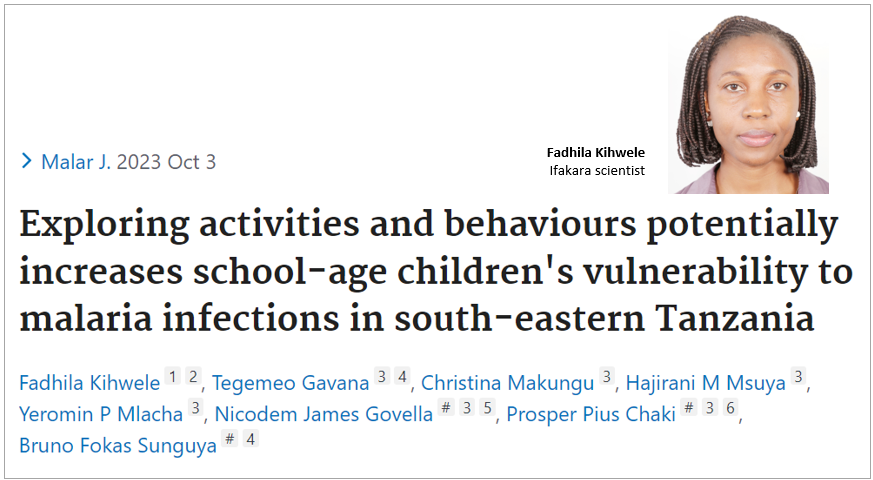
MALARIA: Spike among schoolchildren raises concerns despite progress in elimination

In a recent study conducted in the southeastern region of Tanzania, scientists have discovered a worrisome increase in malaria cases, particularly among school-age children - aged 13 to 18. As a result, the scientists have emphasized the importance of understanding and addressing the underlying causes of this shift, which remain unclear.
While Tanzania has made significant strides in malaria control activities, achieving a remarkable 65% reduction in malaria cases across all age groups over the past two decades, the persistent high risk of infection among school-age children is causing significant concern.
>>Learn about malaria control in Tanzania here
In their study, published on the Malaria Journal this month, scientists from Ifakara Health Institute and Muhimbili University of Health and Allied Sciences (MUHAS) identified several significant factors that seem to increase children's risk of contracting the disease.
These factors were based on responses from 205 community members in three districts - Rufiji, Kibiti, and Kilwa - in southeastern Tanzania, where the study was conducted from 2015 to 2021. Among the participants, 72 were parents, and 133 were school-age children, comprising 65 boys and 68 girls.
The main factors contributing to the ongoing malaria problem among school-age children were identified as routine and seasonal outdoor activities, combined with risky bed net usage behavior. These risky activities included regular domestic tasks, social and cultural events at night, parental migration to farms, and improper bed net usage.
Outdoor nighttime activities raise concerns
One particularly concerning aspect the scientists identified was outdoor nighttime activities that involved prolonged periods of staying in one place, increasing the likelihood of mosquito bites.
Domestic activities such as fetching water, washing kitchen utensils, cooking, and recreational activities like playing, watching television, and studying, are some of the activities that kept school-age children outdoors during the early evening to late night hours exposing them to mosquito bites during peak transmission hours.
Social and cultural events at night
Participation in seasonal social parties, often held outdoors late in the evening and sometimes extending past midnight, was another risky behavior that made school-age children more vulnerable to infectious mosquito bites.
One such event, that the participants mentioned they were fond of called "vigodoro," has become popular in both rural and urban areas of Tanzania. The event has gained prominence in the south and coastal zones of Tanzania and attracts a larger number of school-age children than any other age group in the community.
Traditional male initiation ceremonies, a common practice in various parts of Tanzania, were also identified as risky activities contributing to malaria prevalence among school-age children.
“Tanzania, male initiation ceremonies are common practice… practiced in large parts of the country, especially the southern and coastal regions with high malaria transmission and burden… it is likely that the practice puts a substantial number of school-age male children at risk of infections compared to other age groups,” wrote the scientists.
Parents' seasonal migration to farmlands
In the study, it is also revealed that parents often migrate to farmlands between December and June, leaving school-age children unsupervised, which affects the proper use of bed nets. The seasonal migration patterns usually coincide with high rainfall and increased mosquito breeding, posing a significant risk to the children.
Improper use of bed nets
Improper use of bed nets, particularly a behavior called "ulalavi," where children aged 5 to 10 years spread their legs and hands while sleeping inside bed nets, was identified as another potential risk factor for higher malaria prevalence.
Explaining the behavior, the scientists said, “Ulalavi is not a new sleeping behaviour and it has been reported elsewhere as a reason for high malaria prevalence among bed net users, however, results from this study reported ulalavi as common behaviour to younger children than other age groups and that can increase vulnerability to malaria infection despite the coverage of bed net distribution programmes.”
Knowledge gap within communities
Furthermore, a knowledge gap within the communities was found to contribute to the increased risk of malaria infection among school-age children. Many participants were unaware of the risk of contracting malaria before bedtime, believing that mosquitoes only transmitted malaria after midnight, as suggested by mass campaigns in Tanzania.
Call for further research and interventions
While the study provides valuable insights into the factors contributing to the high risk of malaria infection among school-age children, the scientists called for further research to quantify the risk associated with these behaviors and their impact on malaria control efforts.
“These findings provide preliminary insight into potential risk factors for persisting transmission. Further studies to quantify the risk behavior and activities are recommended to establish the magnitude and anticipated impact on supplementary control strategies to control infection in school-age children.”
They also recommended integrating outdoor malaria vector control measures into existing interventions and emphasized the need to improve housing conditions to reduce exposure to malaria vectors.
Urgent community education initiatives were also deemed necessary to raise awareness about outdoor exposure's contribution to malaria infection and bridge the knowledge gap to enhance individual malaria protection behaviors against infectious mosquitoes.
Contributors
The study's lead authors were Fadhila Kihwele from Ifakara, and Bruno Fokas Sunguya from MUHAS. Other contributors included Tegemeo Gavana, Christina Makungu, Hajirani Msuya, Yeromin Mlacha, Nicodem James Govella, and Prosper Pius Chaki, all from Ifakara.
Read the full publication here
>>Learn more about Malaria here
